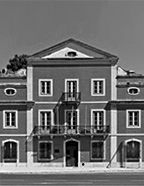

................................
This was to be the last meeting of the Council in 1940, which can only be explained by the busy schedules of its members during this key period of the Commemorations in which the great Portuguese World Exhibition was held (23 June to 2 December). Many academics were involved, including the Secretary General, who was director of the Pavilion of the Portuguese in the World. However, the ordinary sessions kept up the pace of the previous year. In 1940, the projected publication plan, which was fully met, had the total sum of 350 escudos at its disposal, and the following works were published: Cartas dos Governadores da Província do Alentejo a El-Rei D. João IV [Letters from the Governors of the Alentejo Province to King John IV]; Cartas dos Governadores da Província do Alentejo a El-Rei D. João IV e a El-Rei D. Afonso VI [Letters from the Governors of the Alentejo Province to King John IV and King Afonso VI]; Cartas dos Governadores da Província do Alentejo a El-Rei D. Afonso VI [Letters from the Governors of the Alentejo Province to King Afonso VI]; Cartas de El-Rei D. João IV para Diversas Autoridades do Reino [Letters from King John IV to Several Authorities of the Kingdom]; O Manuscrito de Valentim Fernandes e Cartas de El-Rei D. João IV ao Conde da Vidigueira (Marquês de Niza) Embaixador em França [ Valentim Fernandes' Manuscript and Letters from King John IV to the Count of Vidigueira (Marquis of Nisa), Ambassador in France.
And the life of the Portuguese Academy of History remained dynamic beyond the initial goal that led to its refoundation. As determined by its statutes, the publication of an annual Bulletin was launched, which has continued up to the present day, as was the systematic publication of Annals. More Academics were appointed, a request was made for an extension of the Council's mandate, which was granted by Manuel Lopes de Almeida, Under-Secretary of State for National Education, on 22 February 1941, more projects emerged, decisions were taken, other publications were approved, committees were appointed and the Statutes were reformulated and discussed. In 1945 a new President was appointed - Caeiro da Mata. He remained in office until 1963, and was then replaced by Laranjo Coelho, who was followed in 1966 by Manuel Lopes de Almeida. António Silva Rego took up the post in 1972, and was continued by Joaquim Veríssimo Serrão between 1975 and 2006. The Presidents of the Republic are inherently its Presidents of Honour.
